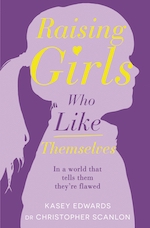A few years ago, a man serving me coffee in my regular cafe said to my young daughter, Violet, “Give us a kiss.”
Inside, I was screaming, “Don’t ask my daughter to kiss you! It’s creepy!”
I remember being presented with cheeks when I was a kid and feeling the discomfort of such forced intimacy. Despite my own bad experiences from childhood, I didn’t intervene on Violet’s behalf. I stood by silently and watched as my little girl hesitated, flinched and then obliged.
As far as I could tell, the man wasn’t being predatory. I didn’t want to offend him or cause a scene. I was being the people-pleasing Good Girl that I’m trying to teach my girls not to be. I prioritised social harmony and appeasing a relative stranger over the wishes of my daughter.
I was wrong.
By remaining silent and acquiescing to a stranger’s request for Violet’s affection, I effectively told my daughter, “It’s okay to say no—unless you make someone else feel awkward or embarrassed and then it’s not okay to say no.”
That is a confusing message even for an adult. It must be utterly bewildering for a child. If there’s one lesson we’ve learned about children, especially young children, it’s that they don’t do subtlety. Most of the time kids work in absolutes. Subtlety comes later.
When it comes to affection, girls need to know that if they don’t want to kiss somebody—or be kissed by somebody—then they shouldn’t have to. In order for our girls to feel confident in exerting ownership over their bodies and refusing someone’s request for affection, they need to know that we as their parents will always back them up unequivocally, no matter how embarrassing this will be for us, or for the person asking for a kiss.
On this occasion in the cafe, and on all the occasions before, I should have stepped in and modelled to Violet that it’s okay to say no, even when it’s socially awkward.
The high five policy
We thought a lot about the implications of that kissing incident in the cafe and what it was teaching Violet about who really owns her body. (Not her.) From that moment on, we decided we would not only never ask our girls to kiss anyone they don’t want to, but also actively help them develop socially acceptable strategies to politely navigate these situations. Now, when someone demands kisses from our girls we suggest they give the kiss-requester a high five or a handshake instead.
Lucy Emmerson, the director of the Sex Education Forum in the UK, recommends that parents give children a selection of alternatives to choose from. “Intervening may be awkward . . . but it is necessary if we are truly to teach children that their bodies are their own and that their instincts should be followed,” Lucy says. “Suggesting alternatives to the child such as a high five, a hug, blowing a kiss or a wave puts the child in control.”
Australian sexuality educator Margie Buttriss says that without guidance it can be difficult for children to know how to respond to unwanted affection. “We’re talking about situations such as when Grandma wants to swoop in for the big sloppy kiss and if the child doesn’t want that to happen what can they do,” she said. “[T]hey can respectfully say ‘No thanks, Grandma, let’s have a hug instead.'”
In a situation where the child does not know the person demanding affection, Margie also recommends kids offer a high five or a fist bump.
These options give children more choices about how they want to respond to friendly advances. Children are introduced to the world of civil graces, recognising and acknowledging others, while also putting boundaries in place. Girls should take for granted that they have the right to say no—even if it causes offence. Personal boundaries should be taught—early and consistently.
Each request for affection is an opportunity to reinforce the message—both in practice as well as in theory—that the only person who decides who your daughter kisses/hugs is her.
Taking things too far?
To be clear, we’re not suggesting that grandparents are sexual predators. Nor are we saying that children shouldn’t be affectionate with grandparents or other relatives and family friends. Our girls love to hug and snuggle with their grandparents and other important adults in their lives. We encourage this.
Some families and cultures are more physically affectionate than others. We are not suggesting there is anything wrong with this type of affection. In fact, in many cases it’s lovely, warm and affirming. But this is not an issue of affection—it’s an issue of choice and who gets to make that choice. If a girl wants to kiss and cuddle her grandmother then that’s wonderful. If she doesn’t want to then we believe that she shouldn’t be forced to. Hopefully Granny will understand that her granddaughter’s right to own her body is more important than Grandma’s (or anyone else’s) desire for physical affection.
While these demands may be innocent and harmless with grandparents, that’s not always going to be the case. Cast your mind a few years into the future when your daughter will face other requests and demands for affection that will not be as innocent and well intentioned as Granny’s.
What about when she gets her first job as a waitress and a sleazy customer slides his hand up her skirt? Should she just put up with it because she doesn’t want to be rude or cause offence?
What about when your daughter is with a boyfriend who’s pressuring her for sex?
What about when the cool boy at school demands she send him a nude selfie?
The research tells us that the vast majority of girls are grossly unprepared for these situations. A study published in the journal Sexuality Research and Social Policy entitled “‘What Should I Do?’: Young women’s reported dilemmas with nude photographs” found that of the nearly 500 girls aged 12–18 years surveyed who’d sent explicit photos of themselves, only 8 per cent of them had actually wanted to send them. The other 92 per cent of girls did it because of a desire to please, to acquiesce or to avoid conflict with a boy.
Some people may object that it’s a pretty big leap from an affectionate kiss for Grandma to being pressured by a boyfriend to send nudes. But, again, this isn’t about affection. It’s about body autonomy. It’s about a girl’s capacity to control her own body. Even when it causes offence.
The ritual of demanding instant affection from children is one of those tiny, everyday lessons in which we teach children—especially girls—that they should tailor their emotional responses to please others. A girl quickly learns that it’s more important she doesn’t upset Grandpa (or Grandma, or her uncle or aunt) than it is for her to feel comfortable. A girl must do something with her body she doesn’t want to do to please someone else. The lesson: the girl does not own her body.
Unless we take corrective action, she may carry this lesson with her throughout her life.
The problems girls face today
First, the good news. Our girls have more opportunities than their mothers and aunties. When it comes to education, they’re smashing it in the classroom, outperforming boys at high school and university.
Young women are emboldened and capable of driving social change. But—and it’s an awfully big “but”—far too many of our girls don’t like themselves. Despite their numerous achievements and their competence, many struggle with confidence, resilience, emotional wellbeing and self-worth. Below is a report card for the issues our daughters face.
Depression: F
Nearly 1 in 5 girls aged 16–17 meet the clinical criteria for depression.
Anxiety: F
Seven per cent, or 1 in 14, of Australians aged 4–17 have experienced an anxiety disorder. This figure only gets worse as our girls age, with 1 in 3 women in Australia experiencing anxiety.
Self-harm: F
A quarter of girls aged 14–15 have had thoughts about self-harming in the previous 12 months and one quarter of girls aged 16–17 told researchers that they had deliberately injured themselves at some point in their lives.
Body image: F
The National Eating Disorders Collaboration found that more than 55 per cent of Australian girls aged 8–9 are dissatisfied with their body, and that by the ages of 10 and 11, 56 per cent of girls try to control their weight.
Eating disorders: F
The Butterfly Foundation reports that eating disorders are the third most common chronic illness for young women. One in 10 people with anorexia nervosa do not live more than 10 years after the onset of the disorder.
Body autonomy: F
Fifty-one per cent of girls say that they often feel pressured to take “sexy” photos of themselves and share them. A survey conducted by Our Watch found that 62 per cent of girls and young women agreed that “girls often feel pressured to take part in sexual activities with their boyfriend or husband”.
This report card is enough to make any parent’s blood run cold. It’s a big part of why we are doing everything we can to build a solid foundation of self-worth while our daughters are young.
Why is this happening? Why are girls who appear to be swimming in a world of opportunity drowning in insecurity and self-loathing?
Because the world can be toxic for girls. We know that’s a big claim, but the reality is that many girls are growing up in a society where they will be invisible if they don’t act sexy, and be branded a slut if they do. The pressure to be thin and beautiful is so pervasive that we have heard stories of primary-school girls dreading going to school because they think that they look fat in their uniforms. And we’re not talking upper primary school here. These girls are barely out of preschool.
Girls grow up being told that they can do anything they want in the world, but they often feel they must do it perfectly. There is no room for mistakes or flaws, no tolerance for imperfection. The fear of being embarrassed or judged can cripple girls’ potential and steal their happiness.
Girls learn early that everything in life is a competition. They are told that their worth, beauty and achievements are only relative to those of the other girls around them, encouraging them to see their allies and friends as competitors and foes. Adults tell them they are powerful and then push them into a world that systematically disempowers them.
Whole industries are built on girls’ fear of not living up to impossible expectations. Their self-worth is corroded bit by bit and then, when their insecurities are ratcheted all the way up, they are sold a supposed solution for a tidy sum.
With all of this going on, is it any wonder many girls blame themselves for not meeting people’s expectations—and their own? But it is we adults who are failing girls. And it is we parents who have the best chance of reversing this downward spiral.

Edited extract from Raising Girls Who Like Themselves. Penguin Life, RRP $34.99.
Read our review of the book
How helpful was this article?
Click on a star to rate it!
0 / 5. 0
Be the first to rate this post!
Kasey Edwards and Dr Christopher Scanlon
Related posts
Subscribe
Receive personalised articles from experts and wellness inspiration weekly!

